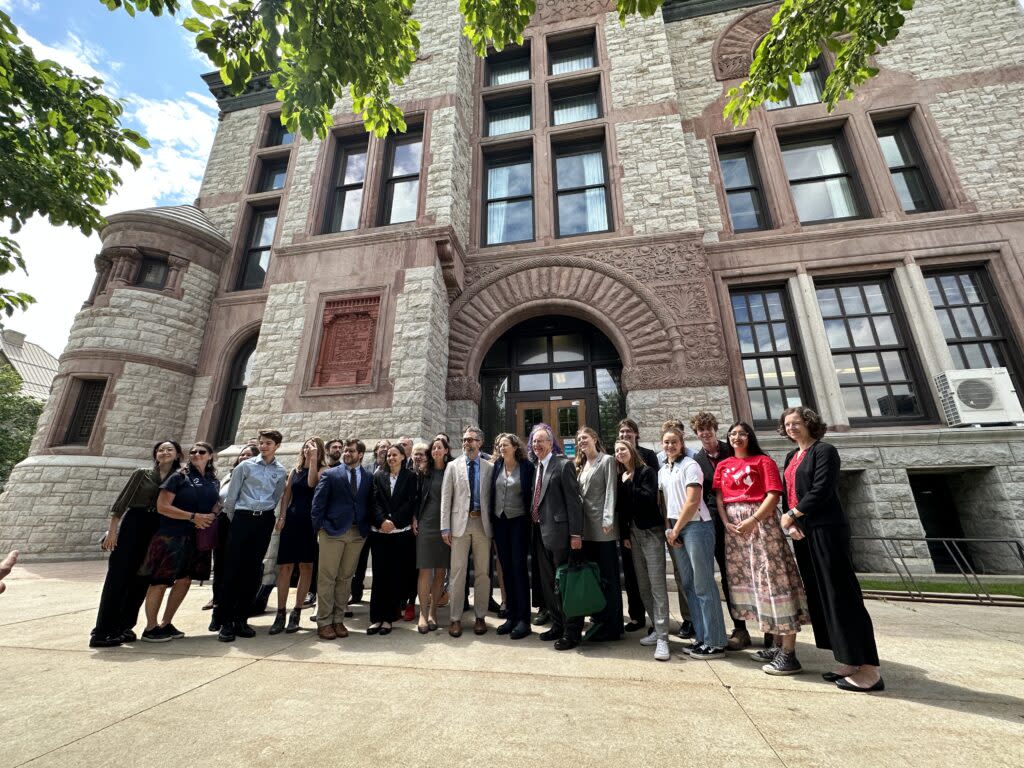Supreme Court oral arguments set for July 10 in Held v. Montana case

Most of the Held v. Montana plaintiffs and their attorneys pose outside the courtroom for photos halfway through the trial. (Photo by Blair Miller, Daily Montanan)
The Montana Supreme Court will hear oral arguments on July 10 in the state’s appeal of the Held v. Montana case, after which the court will decide whether the State of Montana is indeed violating its citizens’ rights to a clean and healthful environment through its greenhouse gas emissions policies.
Oral arguments will start at 9:30 a.m. on that Wednesday in the Old Supreme Court Chambers, Room 303, inside the Montana State Capitol. The attorneys for the 16 youth plaintiffs will get 30 minutes to argue in front of the court, while the state, governor, and multiple state agencies will get 40 minutes total to do so.
The highly anticipated arguments will come nearly 11 months after Lewis and Clark District Court Judge Kathy Seeley sided with the plaintiffs in what they and other environmental groups called a landmark decision in their effort to fight against climate change in Montana.
Last August, Seeley permanently enjoined the 2023 version of what the court called the limitation to the Montana Environmental Policy Act, which prohibited the state from considering greenhouse gas emissions and climate impacts when considering permits for energy and mining projects, saying it violated Montanans’ rights to a clean and healthful environment for current and future generations.
She also enjoined as unconstitutional a portion of another bill passed by the 2023 Legislature, Senate Bill 557, which said that permits approved by state agencies that did not include a greenhouse gas emissions evaluation could not be vacated, voided or delayed unless Congress starts to regulate carbon dioxide as a pollutant under the federal Clean Air Act.
Both pieces of legislation were written directly in response to a Yellowstone County District Court judge’s ruling that temporarily paused ongoing construction on a NorthWestern Energy power plant in Laurel because the Department of Environmental Quality failed to consider the impact of emissions from the plant in approving permits.
That judge later vacated the order after the Legislature passed the two laws, and the Montana Supreme Court heard oral arguments last week on the appeals in that case, noting that part of the high court’s decision in that case regarding the plant’s emissions hinged on the outcome of the Held appeal.
“The court’s concurrent consideration of these two cases allows for a fulsome consideration of the very broad impacts and harm, constitutional infringement, from the climate limitation, and the very specific practical application of that climate limitation to a single large fossil fuel project,” Earthjustice attorney Jenny Harbine, representing the plaintiffs in that case, told the court last Wednesday.
The appeal in the Held case has been fully briefed for three weeks after the state, Gov. Greg Gianforte, the Montana Department of Environmental Quality, Department of Natural Resources and Conservation, and Department of Transportation filed their reply briefs in late April.
The state has argued in its briefs before the Supreme Court that invalidating the MEPA limitation would not fix the injuries the youth plaintiffs claim because climate change is a global problem and Montana’s greenhouse gas emissions are a tiny fraction of the global contribution. The state also wants the court to clarify that Seeley’s district court ruling does not require the state to perform climate analyses, only allows it to do so.
The youth plaintiffs want the court to uphold Seeley’s order, saying the 1972 state constitutional framers put the sections about the environment in specifically to keep the state from degrading the environment through mining and pollution. They say the state has been purposefully avoiding analyzing emissions and climate impacts to further its financial relationship with energy and mining companies.
The Supreme Court previously declined to pause Seeley’s August order pending the appeal by the state, governor and agencies.
Several dozen environmental groups, lawyers’ groups, states, chambers of commerce, energy groups, and others have filed amicus curiae – friend of the court – briefs on behalf of both sides, showing the broad stakes of the case, which is unique because of the environmental protection provisions contained within Montana’s constitution.
“We are grateful to have the opportunity for the 16 Held plaintiffs to present their case to the Montana Supreme Court and remain confident in our legal arguments and in the compelling evidentiary record the Court will review,” said Our Children’s Trust attorney Nate Bellinger, one of the attorneys representing the youth plaintiffs. “We are optimistic that together, we can secure the just outcome that these incredible young leaders, and generations to come, deserve.”
The post Supreme Court oral arguments set for July 10 in Held v. Montana case appeared first on Daily Montanan.

